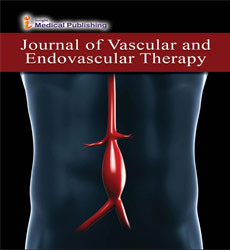Vascular Surgery Advancing Precision and Care in Life Saving Treatments
Chandler Williams
Department of Vascular and Endovascular, Duke University, Durham, North Carolina
Published Date: 2024-10-21DOI10.36648/2634-7156.9.5.215
Chandler Williams*
1Department of Vascular and Endovascular, Duke University, Durham, North Carolina
- *Corresponding Author:
- Chandler Williams,
Department of Vascular and Endovascular, Duke University, Durham, North Carolina
E-mail: williams@gmail.com
Received date: September 20, 2024, Manuscript No. IPJVES-24-20038; Editor assigned date: September 23, 2024, PreQC No. IPJVES-24-20038 (PQ); Reviewed date: October 7, 2024, QC No. IPJVES-24-20038; Revised date: October 14, 2024, Manuscript No. IPJVES-24-20038 (R); Published date: October 21, 2024, DOI: 10.36648/2634-7156.9.5.215
Citation: Williams C (2024) Vascular Surgery Advancing Precision and Care in Life Saving Treatments. J Vasc Endovasc Therapy Vol.9 No.5:215.
Description
Vascular surgery is a specialized field of medicine that focuses on the diagnosis and treatment of diseases affecting the vascular system comprising arteries veins and lymphatic vessels. These structures are vital for transporting blood and lymph throughout the body and their dysfunction can lead to significant morbidity and mortality. Advances in vascular surgery have drastically improved patient outcomes with innovative techniques and tools ensuring precise and less invasive treatments. The vascular system plays a central role in maintaining homeostasis. Arteries carry oxygen rich blood from the heart to tissues while veins return deoxygenated blood to the heart. The lymphatic system aids in maintaining fluid balance and immune function. Disorders in this system can arise due to trauma genetic predisposition, aging lifestyle factors or underlying diseases like diabetes and hypertension. When arteries supplying blood to the limbs particularly the legs become narrowed due to atherosclerosis. Symptoms include leg pain during exercise non-healing wounds and in severe cases gangrene.
Endovascular
An aneurysm is a localized dilation of a blood vessel most commonly threatening necessitating timely surgical intervention. These are dilated tortuous veins often seen in the legs due to faulty valves that fail to prevent backflow of blood. While primarily cosmetic they can lead to complications like venous ulcers or bleeding. Plaque in the carotid arteries can lead to reduced increasing the risk of stroke. Carotid endarterectomy and stenting are common procedures used for management. Vascular surgeons are trained to manage both medical and surgical aspects of vascular diseases. Their expertise spans open surgical techniques and minimally invasive endovascular procedures allowing personalized treatment based on the patient condition. They also collaborate with interventional radiologists cardiologists and other specialists to deliver holistic care. Endovascular techniques involve catheter based approaches often guided by imaging. Procedures such as angioplasty and stenting have revolutionized the treatment of arterial blockages and aneurysms offering shorter recovery times and fewer complications. In complex cases a combination of open surgery and endovascular techniques known as hybrid procedures may be employed. This approach is particularly beneficial for patients with multiple comorbidities. Robotics have added precision to vascular surgery enabling surgeons to perform delicate procedures with enhanced accuracy and minimal invasiveness. Techniques like duplex ultrasound angiography are essential tools in diagnosis and intraoperative navigation ensuring high success rates. Comprehensive care in vascular surgery extends beyond the operating room. Preoperative evaluation involves assessing risk factors like smoking diabetes and coexisting cardiovascular conditions. Postoperative care emphasizes wound management physical therapy and lifestyle modifications to prevent recurrence of vascular issues. Many patients with vascular diseases have underlying conditions such as diabetes chronic kidney disease or hypertension complicating treatment and increasing risks. Limited availability of advanced vascular surgical facilities in remote areas hinders timely treatment often leading to worse outcomes.
Thrombosis
While innovations have improved outcomes the high cost of equipment and procedures remains a barrier in many regions. As life expectancy increases vascular surgeons face the challenge of managing elderly patients who may not tolerate aggressive interventions. Research in bioengineered vascular grafts holds potential for improving outcomes in bypass surgeries and trauma cases. Emerging therapies targeting genetic factors involved in atherosclerosis and thrombosis may revolutionize vascular disease management. Efforts to standardize recovery pathways aim to reduce hospital stays and improve patient satisfaction. Vascular surgery plays a critical role in managing life threatening and quality of life impacting conditions. With a blend of traditional surgical expertise and cutting edge technology vascular surgeons are equipped to address diverse challenges. However, continued innovation inter disciplinary collaboration and efforts to make these advancements accessible are essential for the field to reach its full potential in improving patient care globally. This dynamic specialty not only underscores the importance of the vascular system but also exemplifies the power of medicine to transform lives.
Open Access Journals
- Aquaculture & Veterinary Science
- Chemistry & Chemical Sciences
- Clinical Sciences
- Engineering
- General Science
- Genetics & Molecular Biology
- Health Care & Nursing
- Immunology & Microbiology
- Materials Science
- Mathematics & Physics
- Medical Sciences
- Neurology & Psychiatry
- Oncology & Cancer Science
- Pharmaceutical Sciences
